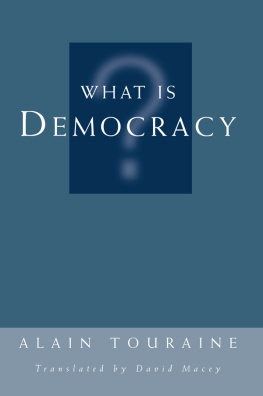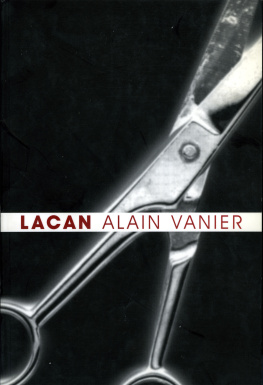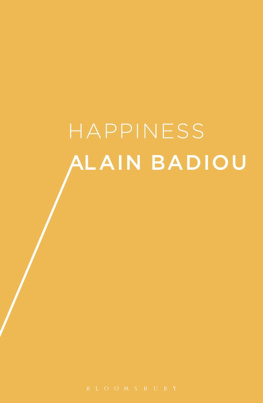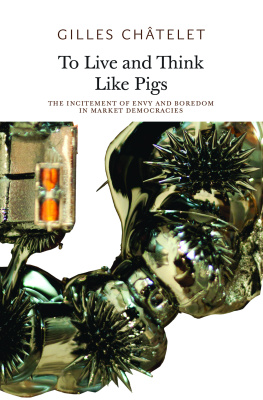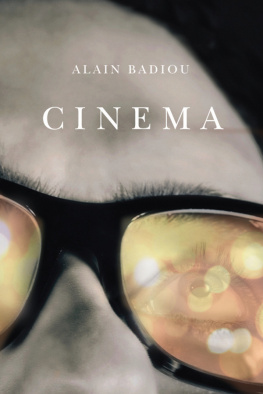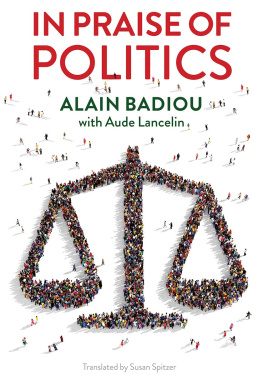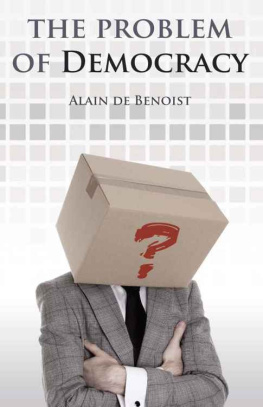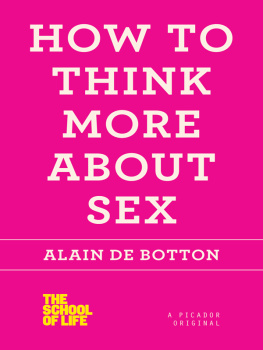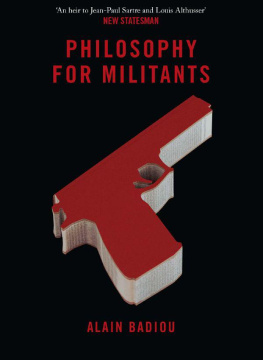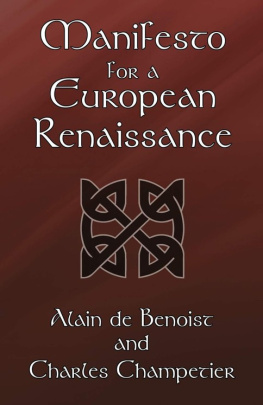A translation subsidy from the French Ministry of Culture and Communication is gratefully acknowledged.
First published 1997 by Westview Press
Published 2018 by Routledge
711 Third Avenue, New York, NY 10017, USA
2 Park Square, Milton Park, Abingdon, Oxon OX14 4RN
Routledge is an imprint of the Taylor & Francis Group, an informa business
Copyright 1997 Taylor & Francis
French edition, Quest-ce que la dmocratie? Librairie Arthme Fayard, 1994
All rights reserved. No part of this book may be reprinted or reproduced or utilised in any form or by any electronic, mechanical, or other means, now known or hereafter invented, including photocopying and recording, or in any information storage or retrieval system, without permission in writing from the publishers.
Notice:
Product or corporate names may be trademarks or registered trademarks, and are used only for identification and explanation without intent to infringe.
Library of Congress Cataloging-in-Publication Data
ISBN 13: 978-0-8133-2707-5 (pbk)
This book is an extension of the reflections with which I ended my previous work, Critique of Modernity (Touraine 1995). I felt the need to take up once more the themes of its final chapter, which deals with democracy, and to expand on them. Just as there is in contemporary thought a close connection between moral philosophy and political philosophy, I wanted to demonstrate that there is a necessary link between democratic culture and the idea of the subject.
In 1989, UNESCO Director General Frederico Mayor Zaragoza asked me to take intellectual responsibility for an international colloquium on democracy to be held in Prague in 1991 under his chairmanship and that of President Vaclav Havel. The introductory and concluding reports that I presented in Prague provided the starting point for this book. I wish to thank Frederico Mayor Zaragoza for the great interest he has taken in my work and for encouraging me to write this book.
Franois Dubet and Michel Wieviorka kindly agreed to read the text before publication, but I owe much more to the constant exchanges I have had with them for so many years. They know how important those exchanges have been to me. Simonetta Tabboni also helped in the preparation of this book. Jacqueline Blayacs remarkable organizational and communications skills made it possible to prepare this work. I owe her much more than she knows.
Alain Touraine
For several centuries we have associated democracy with human liberation, thanks to a combination of reason, economic growth, and popular sovereignty, from the prisons of ignorance, dependency, tradition, and divine right. We undertook to give society an economic, political, and cultural impetus by freeing it from all absolutes, religions, and state ideologies, so that it would be subject only to truth and to the criteria of knowledge. We placed our trust in the apparent links between technical efficiency, political freedom, cultural tolerance, and personal happiness.
But we also have long been beset by worries and fears: Although freed from its weaknesses, is not society now a slave to its own strength, its technologies, and above all its tools of political, economic, and military power? How could the workers who were subjected to Taylorist methods see the rationalization of industry as the triumph of reason, when they were being crushed by a social power in the guise of technology? How could bureaucracy be defined purely as a rational and legal authority, when public and private administrations were controlling and manipulating our personal lives and at the same time promoting their own interests rather than their managerial role? Popular revolutions throughout the world have degenerated into dictatorships over the proletariat or the nation, and the red flag more often flies over the tanks that crush popular uprisings than it does over workers in revolt.
Great revolutionary hopes have been transformed into totalitarian nightmares or state bureaucracies. Revolution and democracy have proved to be enemies, and one does not lead to the other. The world, exhausted by calls for mobilization, would readily settle for peace, tolerance, and well-being, with liberty reduced to meaning protection from authoritarianism and arbitrary rule.
On the European continent, where modern democracy was born, the greatest misfortune of the twentieth century has been not poverty but totalitarianism, and we have therefore fallen back on a modest conception of democracy as a set of guarantees that can prevent a leader from coming to power or holding power in defiance of the will of the majority. Our disappointments have been so profound and so prolonged that, for a long time to come, many of us will agree that the limitation of power is the primary definition of democracy. The appeal to human rights, which was first heard in the United States and France at the end of the eighteenth century and was thereafter silenced so quickly in all countries, is heard once again in protests against all states that claim to represent a truth higher than the sovereignty of the people.
We must, however, define more clearly this necessary limitation of the state, as it can ultimately lead to the omnipotence of the masters of money and information. Limitations on political power can even lead to the decomposition of political society and political debate, which in turn leads to a direct and unmediated confrontation between an internationalized market and introverted identities. The nation-state that was created in Great Britain, the United States, and France was primarily a set of mediations between the unity of the law or science and a diversity of cultures. This nation-state today is being dissolved into the market or, at the opposite extreme, transformed into an intolerant and identitarian nationalism that results in the scandal of ethnic cleansing and condemns minorities to death, deportation, rape, or exile. Squeezed between a globalized economy and aggressively introverted cultures that proclaim an absolute multiculturalism implying a rejection of the other, the political space is fragmenting and democracy is being debasedreduced, at best, to a relatively open political marketplace, which no one troubles to defend because it is not the object of any intellectual or affective investment.
This book offers an answer to the question that arises when we reject both the excessively arrogant mobilizing state and the highly dangerous confrontation between markets and tribes: What positive content can we give to an idea of democracy that is not reducible to a set of guarantees against authoritarian power?
Such an inquiry impinges equally on political philosophy and on the most concrete of acts aimed at reconciling majority rule and respect for minorities, insuring the integration of immigrants and the participation of women in political decisionmaking, and bridging the divide between North and South.
The answer we seek must, first and foremost, protect us from a most immediate threatthe growing dissociation between the instrumentality of the market and the technological world on the one hand and the closed world of cultural identities on the other. How are we to combine the unity of the former with the fragmentation of the latter, the motion with the direction, the objective world with the subjective? How are we to recompose a world that is fragmenting socially, politically, geographically, and economically?

